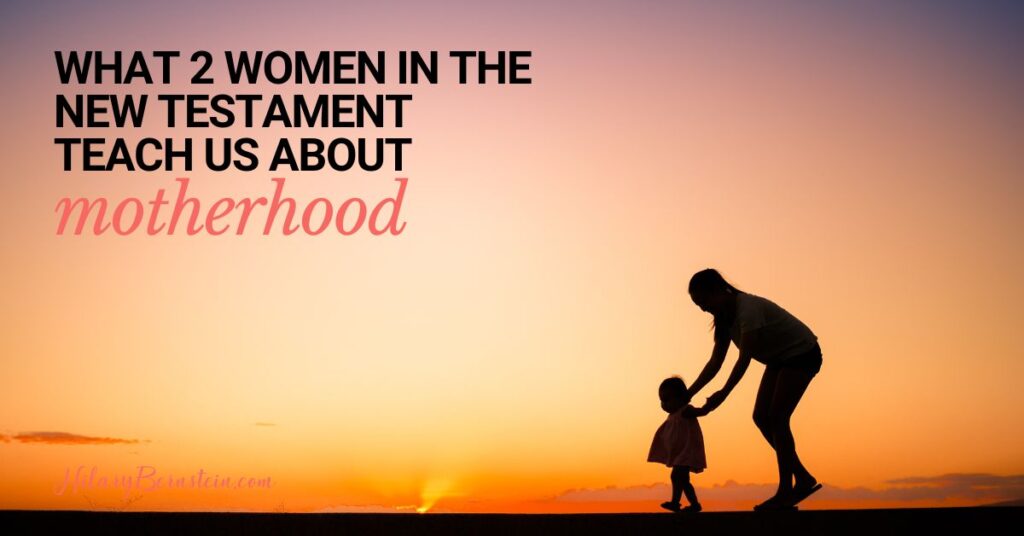What 2 Women in the New Testament Teach Us About Motherhood
Wish you knew some motherhood tips from the Bible? Two women in the New Testament can teach moms so much!
Motherhood has a way of completely changing your world.
You may think you can prepare yourself to become a mom through reading “What to Expect” books and stocking up on diapers and baby clothes and blankets and towels. Yet nothing can prepare you for the tiny person who changes you forever.
Once your tiny, squirming, hungry baby enters the world, you discover that, like it or not, you’re thinking of someone else all.the.time. For years your privacy and sleep disappears as you care for the demands of this other life. Instead of selfishly looking out for yourself (which you may or may not have realized you did), you begin truly looking out for someone else’s interests.
And in the middle of figuring out how to mother this very unique human, you realize God has entrusted this soul with you. It’s your responsibility to teach and train them. Like it or not, you get to shape their world.

A change in perspective
Perhaps it’s because I became a mom well into my 30s, but I was very aware of how my life changed with my children. Before becoming a mom I spent time however I wanted, whether it was enjoying alone time, spending time with my husband or parents or friends, concentrating on my job, and focusing on work around my house.
But once my children entered my life, my focus shifted to them. Even fifteen years later, my life is viewed through the lens of my son and my daughter. What’s best for them? How can I help them? How would any decision affect our family?
Because I choose to view motherhood as a high calling and remember that it’s my responsibility to disciple these two, I try not to take any of it for granted.
Some days, in the middle of mood swings or when selfishness rears its ugly head, this appreciation can feel tricky. But my main perspective is that if God entrusted me with two humans, I need to do my best at being a good steward of them. I need to make the most of my time spent with them.
No matter how old or young our children are, I think we as moms need to remember that we are entrusted with these lives – to nurture and shape and point to Him. It doesn’t matter how old our kids are, or how old we are. That’s what mothers do.
What does the Bible say about mothers?
As we consider mothering, it’s good to remember the Bible includes many examples of moms, and all are depicted in very real ways. In that reality, imperfection isn’t masked.
Because of that, not all moms found in the Bible should be put on a pedestal. For example:
- In the Old Testament, Sarah questioned God’s provision and tried to hurry things along by giving her servant Hagar to Abraham for the sake of childbearing. This impatient lapse in judgment and faith produced conflict that God never intended.
- Sarah’s daughter-in-law Rebekah helped her son Jacob deceive his father Isaac with a disguise. This wasn’t the best lesson a mother could teach her son.
- And in Jesus’ lifetime, Herodias had an affair with her brother-in-law, Herod. When John the Baptist called out the sin, Herodias counseled her daughter to ask Herod for the head of John the Baptist on a platter. Tragically for John, Herod granted her request.
For all the motherhood mistakes in the Bible, there are mothering victories, too. Consider:
- Moses’ mom, who disobeyed Egyptian authorities and kept her infant son in hiding to keep him alive.
- Hannah, who while grieving her infertility, prayed for a child. God heard her prayer, granted her request, and blessed her with a son (and later with other children). Her thanks? She gave her toddler son Samuel back to the Lord to grow up as a servant in the temple.
- Mary, the mother of Jesus, trusted the Lord completely even when she didn’t understand His will and ways. Before she became the mother of the Son of God she honored Him with her life. Lovingly, she raised her son to adulthood and watched Him minister to others through miracles, die a horrific death, and raise from the dead.

A mother-daughter pair
Since there’s a lot to learn from the great moms in the Bible, let’s focus on two in particular: a mother/daughter pair found in the New Testament. Lois and Eunice are mentioned once, in the Apostle Paul’s second letter to Timothy. In 2 Timothy 1:5, we learn:
“I am reminded of your sincere faith, a faith that dwelt first in your grandmother Lois and your mother Eunice and now, I am sure, dwells in you as well.”
Who was Timothy?
To understand them better, let’s dive into what we know about their grandson and son, Timothy. First of all, he’s introduced in Acts 16:1-3:
“Paul came to Derbe and then to Lystra, where a disciple named Timothy lived, whose mother was Jewish and a believer but whose father was a Greek. The believers at Lystra and Iconium spoke well of him. Paul wanted to take him along on the journey, so he circumcised him because of the Jews who lived in that area, for they all knew that his father was a Greek.”
In case you’re unsure where Lystra is, it’s in present-day Turkey (biblically, it was a city in southern Galatia). During Timothy’s life it was ruled by the Romans, and was considered a center of education and enlightenment.
Aside from Romans living there, Lystra also was home to Greeks and Jews. Perhaps that’s how Timothy’s father, a Greek, met Timothy’s mother Eunice, a Jew.
After Timothy’s introduction, the book of Acts details how he joined with Paul and Silas on their missionary journey throughout Europe and Asia.
- Together they passed through cities to strengthen churches in faith.
- From Galatia, they sailed to Philippi, where they met Lydia, a seller of purple cloth. While they were there, crowds protested their gospel message, so Paul, Timothy, and Silas were beaten before moving on to Thessalonica.
- In Thessalonica, people became outraged by the gospel again, so Paul, Timothy, and Silas went away by night to Berea. Timothy and Silas stayed there while Paul moved on to Athens.
- But Timothy and Silas traveled to catch up with Paul in Corinth, the home of their new friends, and sister and brother in Christ, Priscilla and Aquila. While Paul originally befriended Priscilla and Aquila, Timothy grew to know them well.
Because of all this – and his journeys, and all of his interaction with the churches in these locations – Paul mentions Timothy in his letters to the Romans, Corinthians, Philippians, Colossians, and Thessalonians.
These early Christian churches KNEW Timothy. While Paul came in to a region to preach the gospel of Jesus Christ, Timothy stayed behind to teach believers in the churches how to be believers. He turned new believers into disciples of Christ.
Once Paul went on his own way, Timothy was very busy shepherding churches, as Paul details in his 2 letters to Timothy, 1 and 2 Timothy. In his personal letters, Paul coached Timothy how to lead and what to teach.
But in his letters to to the churches, Paul described Timothy as:
- His beloved and faithful child in the Lord.
- Of proven worth, because as a son with a father he served with Paul in the Gospel.
New Testament motherhood
This was who the man, Timothy, was. But how did God establish the work in this young pastor’s life? And what in the world does any of this have to do with motherhood?
2 Timothy 1:5 shares that he had sincere faith:
“ I am reminded of your sincere faith, a faith that dwelt first in your grandmother Lois and your mother Eunice and now, I am sure, dwells in you as well.”
His faith and belief was undisguised, unfeigned, and without hypocrisy. It was sincere.
Like his mother’s sincere faith.
Like his grandmother’s sincere faith.
Somehow, the Apostle Paul knew about Lois and Eunice. Maybe he met them and they welcomed him when he met Timothy in Lystra. We’ll never know, but Paul specifically mentions these two ladies and their faith. That’s a powerful way to be remembered.
We also can learn from this one sentence that Lois believed before her daughter Eunice or grandson Timothy. The family’s faith dwelt in her first. Her faith was sincere and she passed it along to her daughter, then to her grandson.
But it wasn’t Lois’ sincere faith alone that changed at least two generations of her family. 2 Timothy 3:14-15 goes on to fill in the details:
“But as for you, continue in what you have learned and have firmly believed, knowing from whom you learned it and how from childhood you have been acquainted with the sacred writings, which are able to make you wise for salvation through faith in Christ Jesus.”
Eunice raised her son with the Word of God. And most likely, Lois talked to her grandson about Scripture, too. From the time he was a boy, Timothy was acquainted with the sacred writings that ended up making him wise for salvation through faith in Christ.
Motherhood with the Word of God
This work of acquainting your children with God’s Word is right. And it’s biblical. Just as Acts introduced Timothy as the son of a Greek father and Jewish mother, we can surmise that Lois was Eunice’s mother, and both women were Jewish believers in Christ.
As Jews, they would’ve been very familiar with the Pentateuch, or the first five books of the Old Testament. And they would’ve known and obeyed the command found in Deuteronomy 6:6-9:
“And these words that I command you today shall be on your heart. You shall teach them diligently to your children, and shall talk of them when you sit in your house, and when you walk by the way, and when you lie down, and when you rise. You shall bind them as a sign on your hand, and they shall be as frontlets between your eyes. You shall write them on the doorposts of your house and on your gates.”
These women obeyed. They taught the Word of God diligently to their children. Lois taught them to Eunice, and Eunice taught them to Timothy. They talked about the truth of Scripture when they sat in their house and when they walked by the way, and when they lay down, and when they rose.
Timothy couldn’t avoid being acquainted with scripture because his mom and grandma talked about it all the time.

Mothering despite obstacles
It’s not like Eunice’s life or motherhood was free from obstacles. If you’ll notice, her sincere faith was commended. Not her husband’s. The only thing we know about her husband is that he was Greek – and because of that, Timothy needed to be circumcised to appease the Jews he ministered to. Acts 16 hints that Timothy’s father wasn’t a believer – Timothy’s mother was Jewish and a believer but father was a Greek.
Even if her husband didn’t share her beliefs in Christ – or if he did, he must have had a weaker faith than she did – it didn’t stop her. She passed her faith along to her son. His life was forever changed. And because of his faith and obedience to God’s call, countless lives in the early church were forever changed.
So how can moms be like Eunice? And how can grandmas be like Lois? I can see three practical steps for motherhood from this New Testament pair:
1. Teach the Holy Scriptures.
If you’re not in the habit already, get in the habit of reading the Bible by yourself and with your children. Find some time in your day or your week to open up the Bible, read a couple verses, and discuss them.
Bedtime works wonderfully for Bible time with young children. Meal times also are prime times, when you’re all sitting in the same spot. Like the Deuteronomy example, you can talk about biblical truth when you’re sitting in your house. Or when you’re traveling from activity to activity or to the store. Or when you’re getting ready for bed, or when you’re waking up and getting ready for your day.
Get in the habit of spying God in your day, or thinking about things biblically, and then actually talking about it out loud. This might mean you need to make a change and read the Bible more than you do right now. You may need to point to truth when you see it:
- See God’s artistry in a sunrise? Praise Him!
- Hear something in the news that goes against God’s Word? Correct it right away, not only for yourself, but also for your children.
- Grateful for a blessing? Choose to stop and thank the Lord.
Be ready to teach the Word at any time and in any way. Instead of being all preachy, though, make it a part of your everyday conversations. It might feel odd at first, but the more you do it, the more natural it will feel.
For example, my kids are very used to the way I’ll unexpectedly start praying while we’re driving in our car. If it seems like we’re going to be in a close call, I’ll yell for the Lord’s help. When I see an ambulance racing by, I’ll start praying for the people inside. If the clouds look spectacular, I’ll praise the Lord. When I feel led to talk to God, I do – out loud, for my kids to hear.

2. Pass on your sincere faith.
For you to pass something along, you need to have it. You can’t give away something you don’t possess.
So the question is … do you have faith in Jesus Christ? Do you believe He is who He said He was? He said He was the Son of God. He said He was the Way, the Truth, and the Life and that no one could come to the Father except through Him.
If you do believe this, how strong is your belief? Is it lip service? Is it simply what you think should be the right answer? Or are you all in with sincere faith and certainty in your belief?
Once you do have that certain belief and sincere faith, it’s time to pass it along. Talk about it. Live it out.
Like the familiar saying goes, “More is caught than taught.” You can talk about something all day long, but the only thing that people remember is if you’re living it out. Are you authentically and genuinely modeling your faith?
3. Finally, pray.
While this wasn’t mentioned by the Apostle Paul, grandmothers and mothers know the power of prayer.
So much is out of your hands. Your children are opinionated. From the time they’re babies, they choose to do things their own way. They’re not puppets who are able to be controlled. And even if they were, you don’t have all the answers and know the right way to do everything.
By praying, we can let go of any sort of image of control we might think we have. We can turn things over to the Lord, who IS the One who can make a difference in our children’s lives.
God loves our sons and daughters more than us, and has a plan for each of their lives. Through prayer, we can honestly share our concerns and hopes and fears, all while not burdening ourselves or our children – but releasing everything to the Lord.

When should you start?
The good news about all of these three steps – teaching the Holy Scriptures, passing on your sincere faith, and praying for your children – is that it’s never too early to begin. If your children or grandchildren are young, start this kind of mothering or grandmothering now!
But it’s also never too late to begin. If you feel like you’ve messed up and have wasted time, just start fresh. Get into the Scripture and don’t be afraid to talk about it. Model what a life of sincere faith is like. And pray.
As you do these three things, the Lord will work in your motherhood. Your life and your children’s lives will be transformed.
What will you focus on today in your motherhood? Teaching the Word? Passing on your sincere faith? Or praying?
- Getting Caught Up with All You Need to Do - February 3
- Welcoming The Tension of Tidy into the World! - January 28
- Becoming Content with Reality in Your Home - January 20







